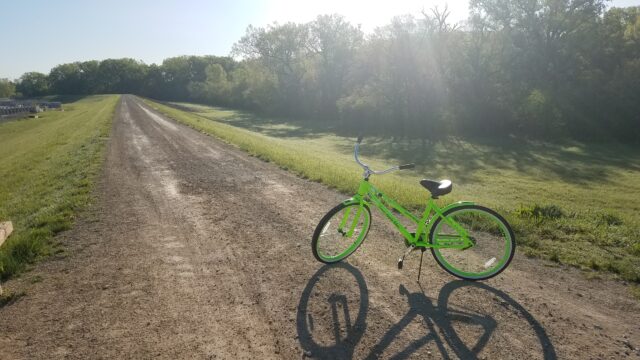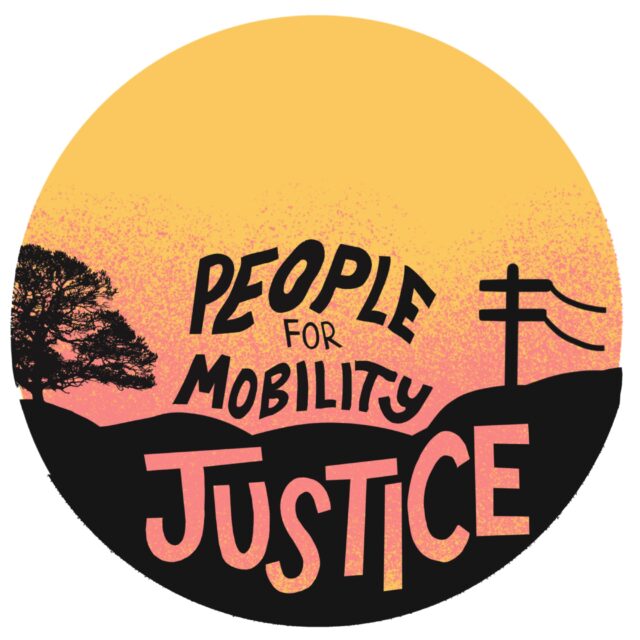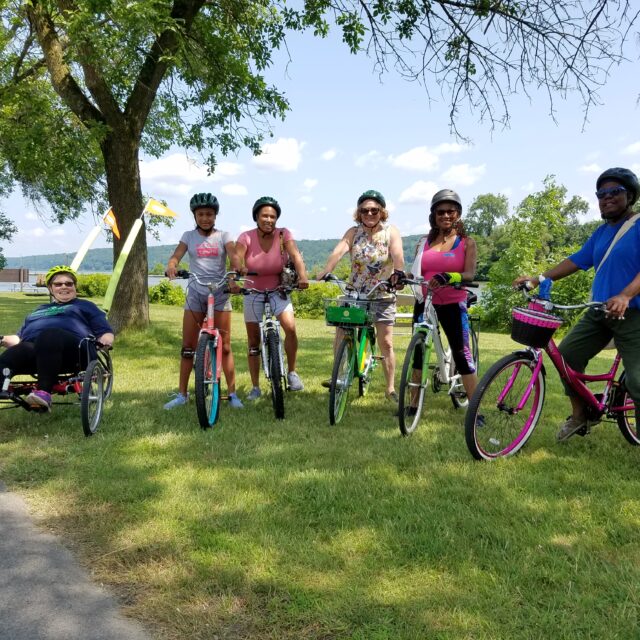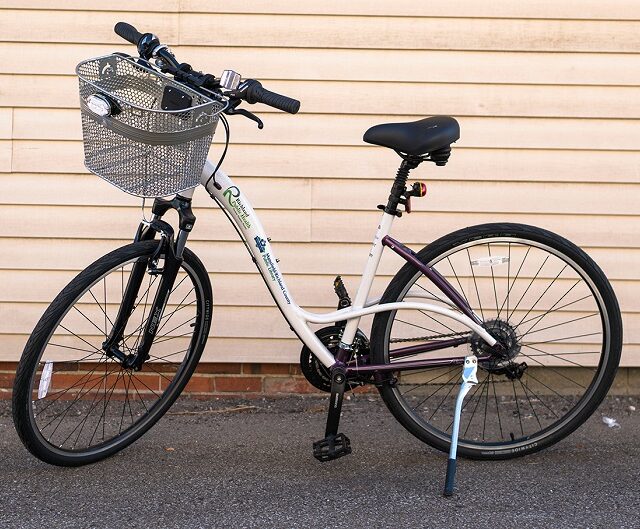Bike Share’s Not Just for Cities
by Kiran Herbert, Communications Manager
July 19, 2021
In Kansas, two rural bike share systems are completely free and fixing to broaden their impact.

Green Apple Bikes, based in Manhattan, Kansas, offers residents free, unlimited access to one-speed cruisers.
In the U.S. and around the globe, bike share systems are predominantly found in cities, a trademark of places keen on cutting down their carbon footprint, improving mobility options and relieving congestion. As with many things—like accessible healthcare facilities and grocery stores—rural America has been left behind.
It’s an unfortunate trend because rural Americans, who make up 15% of the population, arguably have the most to benefit. Not only do they live further afield of essential services, with limited transportation options for those without a vehicle, they also suffer from numerous health disparities compared to their urban counterparts. Studies from the CDC highlight that rural Americans are more likely to die from heart disease, cancer, chronic lower respiratory disease and stroke than those living in cities. On the list of things that can be done: Encourage physical activity.
Thrive Allen County, the largest and most prominent rural health advocacy organization in Kansas, was founded in 2007 in order to promote more holistic healthcare in Allen County, which has a population of around 12,000 people. That means promoting initiatives like safe housing and early childhood development alongside things like health insurance assistance and the local farmers market.
“Our work is not just about helping people get to doctors’ appointments, it’s also about having access to trails and to playgrounds and having transportation services,” says Jessica Thompson, deputy director of Thrive Allen County.
In the last 15 years, the organization has been pivotal in helping the community transform from a place that had zero hiking and biking trails to one that will have 43 miles by the end of this year. In 2018, Thrive Allen County launched a free bike share program with the hope of getting more visitors and locals alike on those trails. What started with five bikes in one location has since grown year over year to now include 45 bikes in eight locations.
“We quickly found that the majority of people using our bikes were using them as their main source of transportation to get to work, to get to the grocery store, to get to doctors appointments, or to just get around town,” says Thompson. “They were also using them for weeks and weeks at a time.”
In order to encourage the trend, Thrive Allen County decided to launch an earn-a-bike campaign, where frequent system users would receive a bike upon the completion of a maintenance course, as well as a series of bike workshops. That program, which launched just a couple of months ago, is now underway.
“The number one reason why people stop biking is that a chain breaks or a tire gets spent and they don’t know what to do or how to fix it,” says Thompson, noting that 17% of the county’s population is low-income and unable to purchase expensive gear like a new bike. “We wanted anyone in town to be able to learn how to maintain a bicycle if they wanted.”
Using BBSP mini-grant funding, the nonprofit will hire a local ambassador to offer free bike repair workshops to residents countywide, setting up shop during farmers markets and other community events, such as “Back to School Night” and the annual “Sidewalk Sale.” Thompson hopes the come-and-go, casual setup will draw more people in and encourage them to ask questions. Thrive Allen County hopes to empower locals and increase ridership as it continues to build up trails and work on connections between localities.
In Manhattan, Kansas, a town of roughly 55,000 people 150-miles northwest of Allen County, a different sort of free bike share system has taken root. On a trip to New York City, Ward Morgan, a Manhattan resident who owns a software company in town, experienced Citi Bike for the first time. Enamored with the prospect of a healthy mobility option, he launched Green Apple Bikes (GAB) in September 2015. However, instead of the sophisticated technology we’re used to seeing in the shared micromobility space, the Green Apple System is exclusively made up of branded, one-speed cruisers—a bike share system, but at a fraction of the typical cost.
“What if I got a bunch of cheap bikes and put them out there and see what happens,” says Jonathan Rivers, GAB’s program director, adding that the honor system experiment has paid off. “Since then, it’s just expanded.”
Today, GAB has purchased some 900 bikes and has around 400-500 on the streets at any given point. Funded by 18 different corporate sponsors, as well as individual donations, the system is completely volunteer-run. If a bike is in distress or needs work, residents can call a volunteer-staffed hotline, which will then route the bike to another volunteer to tackle maintenance (all bikes are also given the once-over from a locally-contracted bike shop for quality control).
“People ride these things everywhere,” says Rivers. “It shouldn’t work but it does and that’s a testament to the community.”
Although the system isn’t perfect—the bikes don’t have tracking systems, meaning it can be a bit of a scavenger hunt to find one—it’s been a resounding success when it comes to getting people to ride. Recognizing that some residents were using GAB bikes as their primary mode of transportation, Green Apple Bikes launched its Essential Bikes initiative in order to further accommodate the community’s transportation needs. The program matches donated, refurbished bicycles with folks in need, providing a helmet, light and credit for ongoing bike maintenance at a local shop.
“If they get a flat or what-have-you, they have about fifty dollars that they can use towards getting that fixed,” says Rivers. “We wanted to alleviate some pressure and provide some better solutions.”
Keeping with that mission, the organization will launch a series of share boxes in select locations around Manhattan. The 10 boxes, which might increase in number throughout the summer, will be stocked with everything from books to non-perishable foods. BBSP funding will help with setting up the system, as well as supplying bike safety gear, such as reflective headbands and vests.
“We wanted to see what can we do to continue to support groups by providing goods that meet the needs of not only hunger but also promote literacy and better bicycle safety,” says Rivers. “[These share boxes] are one way we’re trying to address some of those equity issues.”
While both Green Apple Bikes and Thrive Allen County have taken vastly different approaches to bike share, they’ve both had an outsized impact on their respective communities. Not only have they filled a crucial transportation need, helping connect folks to things like jobs, grocery stores and health care, but they’ve also provided an option for recreation and mental well-being. Naturally, residents in these towns think of themselves as bike-friendly.
“This community has really built up a biking community and they’re very proud of that,” says Thompson. “There are places that we still need to work on but for a rural community to be this invested in biking is great. We have new roads being worked on and 15 years ago bike lanes wouldn’t even be considered—now they’re at the top of the priority list. There’s been a real shift in the thinking of our community.”
The Better Bike Share Partnership is funded by The JPB Foundation as a collaboration between the City of Philadelphia, the National Association of City Transportation Officials (NACTO) and the PeopleForBikes Foundation to build equitable and replicable bike share systems. Follow us on Facebook, Twitter and Instagram or sign up for our weekly newsletter. Got a question or a story idea? Email kiran@peopleforbikes.org.



